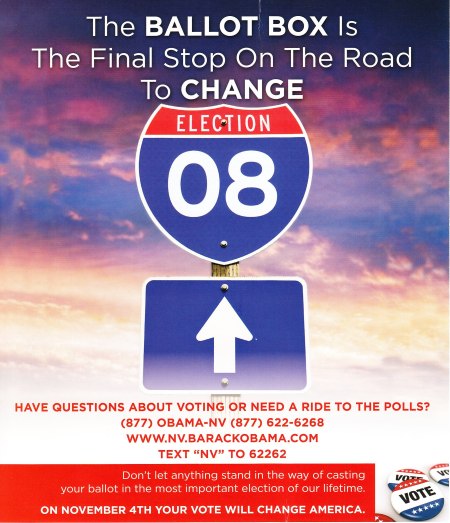Strategery for the post-Bush era #2
ALLies,
First, (re-)read Shawn Wilbur’s excellent post from September, Time to free ALL the political prisoners. Also, the discussion on part Strategery for the post-Bush era part 1, and The Empire is Not American, But Washingtonian, and Beyond Blockades. Now, let’s brainstorm.
By the day after tomorrow, we will know something about what regime we’ll be facing for the next four years. Electoral politics are weird, and anything could still happen. But the chances are very good at this point that, a few months from now, (1) the Bush administration will be gone, (2) the Democratic Party will hold even larger majorities in the House and the Senate, and (3) it’s likely, although by no means certain, that there will be Democratic President and administration headed by Barack Obama. This after 6 years of trying to get by under a Republican-dominated government, and 2 years of divided government, which has largely maintained the status quo without any challenge or change. Or, less likely but certainly possible, that there will be a divided government, with both houses held by large Democratic majorities, and with the Presidency in the hands of John McCain. Whatever the case may be, the process of transition and of setting the tone will begin the day after tomorrow when the election results are finalized.
Meanwhile, among movement libertarians, there have been some significant shifts as the Bush era draws to a close. Chairman Ron’s Great Libertarian Electoral Revolution has dissolved, but there are remnant groups remaining. Most of those who have not simply dropped out of electoral politics or returned to their favorite evil of two lessers, seem to have either (re-)joined the LP or launched into an almost certainly futile crusades to take over their local Republican Party aparat. Meanwhile, in the Libertarian Party, the Barr/W.A.R. ticket has successfully marked the take-over and rebranding of the Party, with the express invitation and encouragement of an opportunistic and easily-awed leadership, by small-government conservative
exiles from the fracturing Republican party. The election results (i.e., whether the LP’s inevitable miserable failure at the polls turns out to be a little less miserable or a little more miserable than its usual 0.25%-0.5% performance) will probably play some role in determining whether or not this rebranding is consolidated or not over the next few years. On the other hand, alleged political pragmatists
are in leadership positions and are, as a rule, immunized against any empirical falsification of their views (if the LP does better, it’ll be taken as proof that the strategy worked; if it does worse, it’ll be taken as proof that they needed even more of the same). So, depending on the breaks, the LP may be stuck with more ridiculous conservative tools at the top of the ticket for some time to come. But if it is not, then the LP’s future may well be marked by left-sympathetic radicals like Mary Ruwart. A lot will turn on the usual weirdness of LP internal politics, and on what happens in the immediate aftermath of the election, starting, again, the day after tomorrow.
The most important point to make about the upcoming electoral coup is that, even if there is a massive change-over in the balance of power in Washington, D.C., it won’t change much of anything fundamental. There will be shifts on the margins — some for good, some for ill, and most of them neutral shifts of patronage and privileges from one set of power-brokers to another set of power-brokers. Whatever may be the case, radicals will have to go on organizing and go on fighting uphill against the warfare State, paramilitary policing, plutocratic state capitalism, government managerialism, the forced-pregnancy brigade, the War on Drugs, the border Stasi, and all the rest of it.
But also, presumably, the changing of the guard in the State citadel will mean that some of the facts on the ground are going to change, as is some of the rhetoric and some of the constituencies of Power. Presumably that means that we are going to have to make some shifts in tactics and strategy for outreach, organizing, education, evasion, resistance, etc. in the coming months. The time to start talking about this, and to start laying the groundwork for what we will be doing in the coming years, is now, if not six months ago. We need to start thinking about where should we go, who should we talk to, and what should we do from here on out.
So, with all that in mind, what changes are there likely to be in the challenges we'll face during the post-Bush era, and under a consolidated Democratic Party-dominated regime in D.C.? What about under a McCain Presidency with a consolidated Democratic Party-dominated Congress? What changes in strategy, tactics, outreach, education, propaganda, and institutional infrastructure do you think that anti-statist liberation movements need to make, and what should they start doing now in order to be able to make those changes?
Let's reason together and talk about it in the comments. (Or on your own blog, if you want the extra space; if so, leave a comment here with a link back to your post.)

